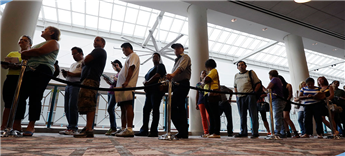Our Perverted Tax Code Actullay Encourages Poor Not to Work
IBDEditorials.com

People wait in line to sign up for unemployment in
Atlantic City, N.J. AP
Taxes: Candidates in Tuesday night's Republican debate found near-universal agreement on one thing: The U.S. tax code is an impediment to growth and needs to be radically simplified. A new report shows why this is so.
The nonpartisan Tax Foundation has put out a new report titled "Income Tax Illustrated ." OK, cue the jokes. But it isn't boring. Really.
In stark, numerical terms, it shows just how bad our tax code has gotten — and how it not only violates the idea of equal treatment under the law, but undercuts the very idea of work for some.
Americans might not realize it, but our tax code seems designed to keep poor people poor, by layering on disincentives for those at low incomes to work hard and better themselves.
"As low-income households earn more money, not only do their tax burdens grow rapidly, but they also receive fewer benefits from federal social assistance programs," the report said. "In fact, individuals who move to higher-paying jobs sometimes end up with less overall disposable income, after taxes and transfers."
The report uses two examples, as noted by the Washington Beacon. In one, a single parent earns $4,800 in salary before taxes. That's not much, but because of entitlements such as Medicaid, Temporary Assistance for Needy Families, the Children's Health Insurance Program, food stamps, and Housing Choice Vouchers, that person's take-home pay for the year jumps to $22,090 — not a lot, granted, but it's more than 4-1/2 times greater than what that person actually earned working.
That compares to someone who earns $21,000 before taxes but, because of taxes and entitlements, takes home $24,057 for the year.
Yes, that person earns $16,200 more from work, but takes home just $1,967 more, thanks to the tax code and generous benefits to those with less income.
"As low-income households earn more money, not only do their tax burdens grow rapidly, but they also receive fewer benefits from federal social assistance programs," the report said.
"In fact, individuals who move to higher-paying jobs sometimes end up with less overall disposable income, after taxes and transfers."
This is perverse, to say the least. And it's a major reason why some at the bottom of the nation's income distribution never find work. Often, it just doesn't pay.
Or, as the Tax Foundation put it, "the federal system of taxes and benefits distorts individuals' work decisions, making it more difficult for low-income individuals to increase their incomes through the labor market."
Believe it or not, this bizarre distortion gets worse when you consider a married couple with two kids.
Because the Earned Income Tax Credit is phased out at higher incomes, a family of four making $48,000 faces a marginal tax burden of 43.7% — an absurd disincentive to work harder and earn more for families.
Whatever else you think of our tax code, it discourages work and encourages dependence — the very things, ironically, that ensure people stay poor.
Our byzantine tax system looks as if it were
designed to keep the poor down and dependent on big
government. But to believe that, of course, would be
cynical.

